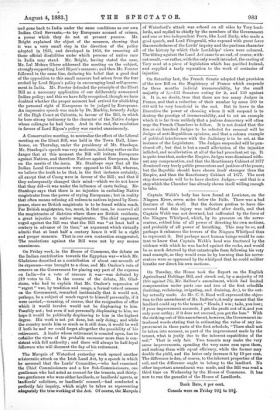On Friday week, in the House of Commons, the debate
on the Indian contribution towards the Egyptian war—which Mr. Gladstone described as a contribution of about one-seventh of its ekpenaes—was brought to a close, and Mr. Onslow's vote of censure on the Government for placing any part of the expense on India—for a vote of censure it was—was defeated by 210 votes to 55. In the course of the debate, Mr. Glad- stone, who had to explain that Mr. Onslow's expression of " regret " was, by tradition and usage, a formal vote of censure on the Government, remarked incidentally that it would not, perhaps, be a subject of much regret to himself personally, if it were carried,—meaning, of course, that the resignation of office which it would involve would not be displeasing to him. Possibly not ; but even if not personally displeasing to him, we hope it would be politically displeasing to him in the highest degree. His work is not yet done, but only doing ; and while the country needs him as much as it still does, it would be well if both he and we could forget altogether the possibility of his retirement. A leader whose retirement is counted upon, has to consider the views of his probable successor more than is con- sistent with full authority ; and there will always be half-loyal followers who will discount the day of his retirement.


































 Previous page
Previous page